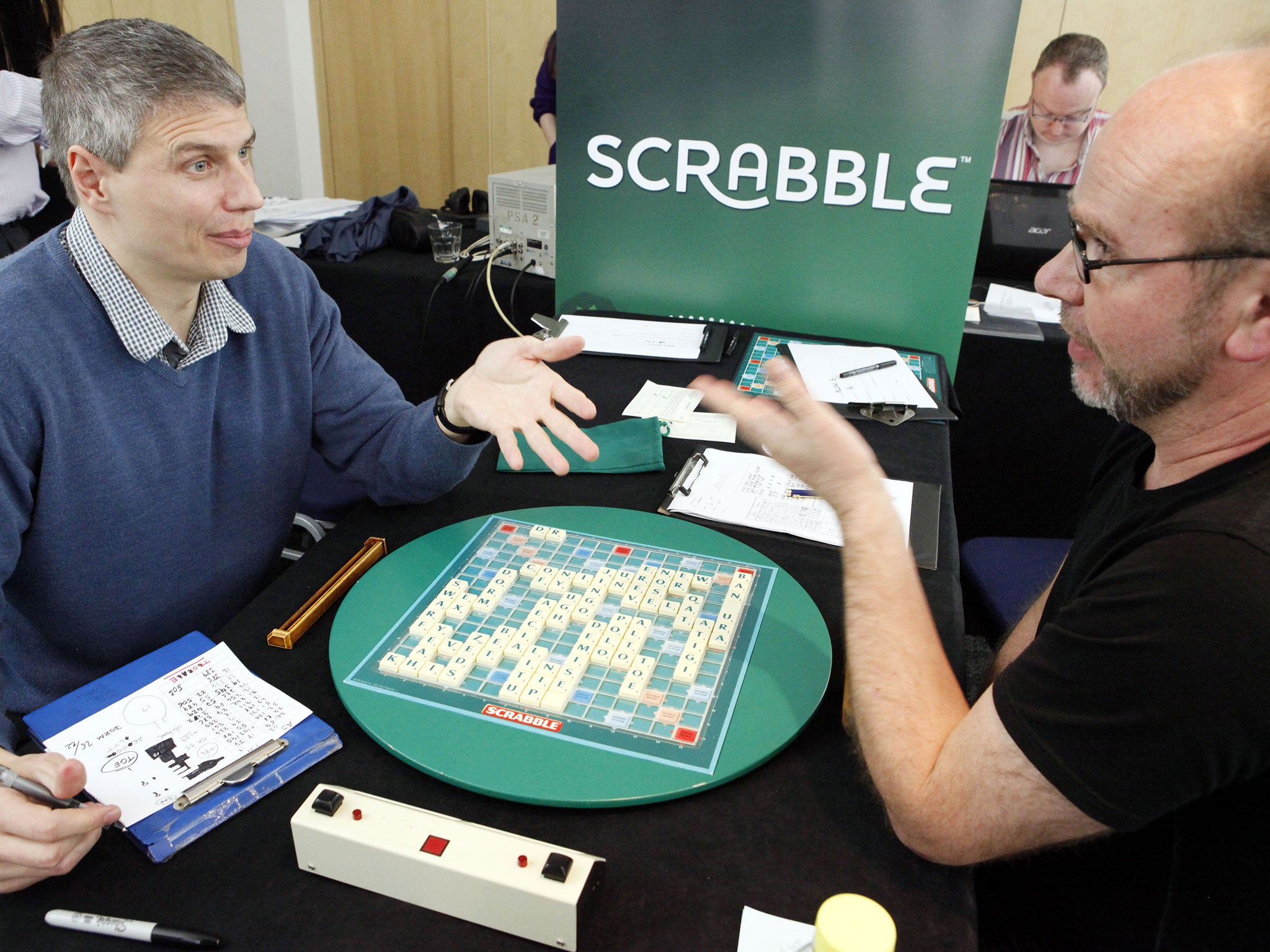National Scrabble Championship: The big match won by the playing of a Ukrainian lute (bandura, 86 points)
Being a Scrabble champion is easy. You just need to revise 2,000 words a day
Click image to enlarge final board - definitions to the tougher words are listed below
To many, it’s a game reminiscent of childhood tantrums and lunchtime squabbles over proper nouns, but to hardcore fans, Scrabble is a test of concentration, creativity and quick thinking.
Yesterday, lovers of the popular word game were on tenterhooks (18 points) as finalists Paul Allan and Allan Simmons battled to win the wordsmith’s dream accolade: National Scrabble Champion 2013. Nearly 10,000 people went online to watch the game that seemed, initially, to be too close to call. As the contestants broke for lunch, the score stood at one-all in the best-out-of-five tournament. Mr Allan took the third game.
The tension in the room was palpable as the final minutes ticked away, with Mr Simmons making snap decisions in a desperate attempt to claw victory, and the £2,500 prize money, from his opponent’s clammy grasp.
Playing the word “demises” spelt the end for Mr Simmons, however, and Mr Allan stormed ahead, winning the fourth game with the word “bandura” (a Ukrainian lute), scoring 86 points and snatching the title. His final score was 503, beating Mr Simmons’ tally by an impressive 114 points. “I’m delighted to have won,” said Mr Allan, who admits spending up to 10 hours a day revising 2,000 words to keep them fresh in his mind. “Allan played exceptionally well and was a delight to compete with.”
The winner, who enjoys Scrabble because it combines maths and language, revealed he wouldn’t be celebrating his triumph with a night on the tiles, opting instead for a relaxing evening on the sofa. “I think I’ll just have a takeaway,” he said. “Nothing too exciting.”
Mr Allan also denounced the controversial use of proper nouns in Scrabble, claiming it was not a good idea and had never been suggested seriously. “People are free to play however they like but it’s not an official rule,” he said.

The competitors, who are both Scottish, are no strangers to the competition, although this was the first time they had faced each other in the national championships. Mr Simmons, 56, a Scrabble consultant who enjoys DIY (no mention of whether tiling is a speciality), won the title in 2008 – one year after teacher Mr Allan, 43, claimed victory. Yesterday the pair played in a separate room at the Cavendish Conference Centre, west London, with their moves being placed on a large board in a theatre in front of a 100-strong audience.
The 2000 Champion, Brett Smitheram, was on hand to explain the game as it went along, discussing potential moves with the audience and even cracking a few jokes about the two former champions’ wordplay (“I think we can all agree ‘bananas’ would be a slip up”).
The competitors had 25 minutes in which to complete their moves, but could choose to use the time however they wanted – for example, taking 30 seconds to complete one word but 10 minutes to complete another.
Notable words played throughout the final included “kernite”, a mineral, (worth 100 points), “exordial”, meaning introductory (92), and “shrieval”, relating to a sheriff (97). The tournament, which started in 1971, attracted nearly 300 people to the six regional championships earlier in the year.
The best players from each regional final qualified for the semi-final in Cardiff, a series of fiercely fought matches which saw Mr Allan and Mr Simmons compete against 57 players in 14 games to win the two coveted spots at the final.
Both players will now go back to the (drawing) board to prepare for the world championships in December.
Words of wisdom: the final board
Aecia Fruiting bodies of some rust fungi bearing chains of aeciospores.
Atigi A type of parka worn by the Inuit in Canada.
Bandura Ukrainian lute
Coniines Poisonous alkaloids found in hemlock.
Demises Plural form of demise
Enew A falconry term meaning to drive back to the water, or to pursue.
Erev The part of the day or the day immediately preceding the Jewish Sabbath or a Jewish holiday.
Evet The common newt.
Fy An interjection expressing disgust.
Jingo A vociferous supporter of policy favouring war, especially in the name of patriotism.
Khis The 22nd letter of the Greek alphabet.
Ny To approach.
Litu Plural of Litas, a former silver coin and monetary unit of Lithuania.
Qat A variant spelling of khat, the leaves of an Arabian shrub, which are chewed (or drunk as an infusion) as a stimulant.
Swarf Fine chips or filings of stone, metal or other material produced by a machining operation.
Ugh Used to express disgust or horror.
Vela Plural form of velum.
Zeal Great energy or enthusiasm in pursuit of a cause or an objective.
Zeds The letter Z, plural.
Join our commenting forum
Join thought-provoking conversations, follow other Independent readers and see their replies
Comments